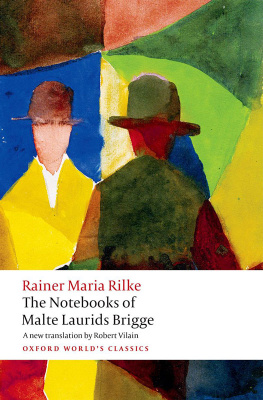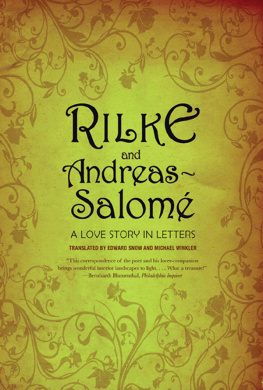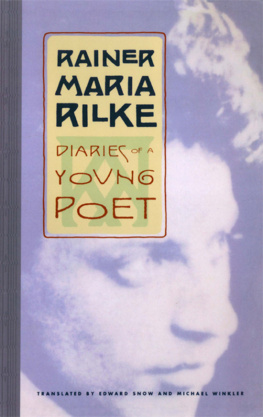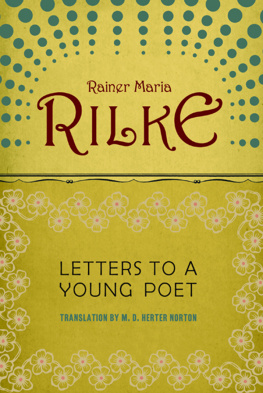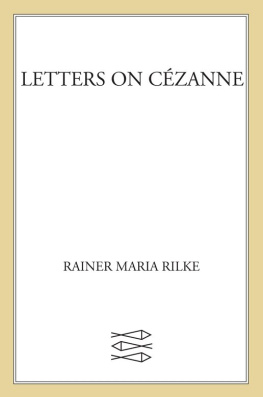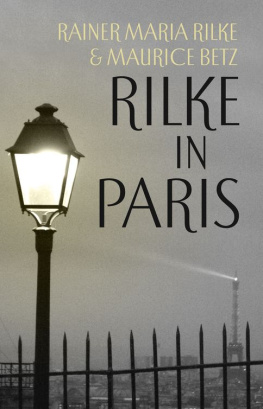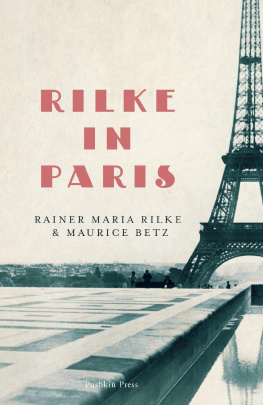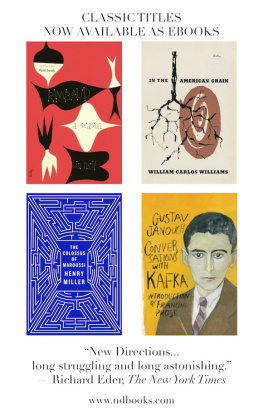Rainer Maria Rilke - The Notebooks of Malte Laurids Brigge
Here you can read online Rainer Maria Rilke - The Notebooks of Malte Laurids Brigge full text of the book (entire story) in english for free. Download pdf and epub, get meaning, cover and reviews about this ebook. year: 2016, publisher: OUP Oxford, genre: Detective and thriller. Description of the work, (preface) as well as reviews are available. Best literature library LitArk.com created for fans of good reading and offers a wide selection of genres:
Romance novel
Science fiction
Adventure
Detective
Science
History
Home and family
Prose
Art
Politics
Computer
Non-fiction
Religion
Business
Children
Humor
Choose a favorite category and find really read worthwhile books. Enjoy immersion in the world of imagination, feel the emotions of the characters or learn something new for yourself, make an fascinating discovery.
- Book:The Notebooks of Malte Laurids Brigge
- Author:
- Publisher:OUP Oxford
- Genre:
- Year:2016
- Rating:5 / 5
- Favourites:Add to favourites
- Your mark:
- 100
- 1
- 2
- 3
- 4
- 5
The Notebooks of Malte Laurids Brigge: summary, description and annotation
We offer to read an annotation, description, summary or preface (depends on what the author of the book "The Notebooks of Malte Laurids Brigge" wrote himself). If you haven't found the necessary information about the book — write in the comments, we will try to find it.
Rainer Maria Rilke: author's other books
Who wrote The Notebooks of Malte Laurids Brigge? Find out the surname, the name of the author of the book and a list of all author's works by series.
The Notebooks of Malte Laurids Brigge — read online for free the complete book (whole text) full work
Below is the text of the book, divided by pages. System saving the place of the last page read, allows you to conveniently read the book "The Notebooks of Malte Laurids Brigge" online for free, without having to search again every time where you left off. Put a bookmark, and you can go to the page where you finished reading at any time.
Font size:
Interval:
Bookmark:

OXFORD WORLDS CLASSICS
THE NOTEBOOKS OF MALTE LAURIDS BRIGGE
Rainer Maria Rilke was perhaps the greatest poet writing in German in the twentieth century. Born in Prague on 4 December 1875, he passed much of his unhappy youth in military academies before he matriculated at university, first in Prague and later in Munich and Berlin. His first volume of poetry, Lives and Songs, was published in 1894 and by 1900 he had completed another seven. Two visits to Russia with Lou Andreas-Salom in 1899 and 1900 (inspiring The Book of Hours, 1905) were the first of many extended journeys he was to make, to France, Italy, Scandinavia, Spain, North Africa, and Egypt, before he settled in Switzerland in 1919. He married the artist Clara Westhoff in 1901, and they had a daughter, Ruth, before separating a year later.
Rilkes lyrical prose tale about the Love and Death of the Cornet Christoph Rilke (1906) achieved cult status, but his poetic breakthrough came with the publication in 1907 and 1908 of two volumes of New Poems, written after he moved to Paris in 1902, where he worked for, and wrote on, the sculptor Auguste Rodin. His only novel, The Notebooks of Malte Laurids Brigge, appeared in 1910. At the outbreak of war in 1914 Rilke was in Munich, and he discharged his military service in an archive in Vienna. By then he had begun the Duino Elegies, although these were not completed until February 1922, in the Chteau de Muzot in the Valais. The same month saw the composition of the whole of The Sonnets to Orpheus. Rilke died of leukaemia on 29 December 1926, aged 51.
Robert Vilain is Professor of German and Comparative Literature at the University of Bristol and Lecturer in German at Christ Church, Oxford. He is the author of The Poetry of Hugo von Hofmannsthal and French Symbolism (Oxford, 2000), and co-editor with Karen Leeder of The Cambridge Companion to Rilke (Cambridge, 2010) and Nach Duino: Studien zu Rainer Maria Rilkes spten Gedichten (Gttingen, 2010). He edited Rilkes Selected Poems for Oxford Worlds Classics in 2011.
OXFORD WORLDS CLASSICS
For over 100 years Oxford Worlds Classics have brought readers closer to the worlds great literature. Now with over 700 titlesfrom the 4,000-year-old myths of Mesopotamia to the twentieth centurys greatest novelsthe series makes available lesser-known as well as celebrated writing.
The pocket-sized hardbacks of the early years contained introductions by Virginia Woolf, T. S. Eliot, Graham Greene, and other literary figures which enriched the experience of reading. Today the series is recognized for its fine scholarship and reliability in texts that span world literature, drama and poetry, religion, philosophy, and politics. Each edition includes perceptive commentary and essential background information to meet the changing needs of readers.

Great Clarendon Street, Oxford, OX2 6DP
United Kingdom
Oxford University Press is a department of the University of Oxford. It furthers the Universitys objective of excellence in research, scholarship, and education by publishing worldwide. Oxford is a registered trade mark of Oxford University Press in the UK and in certain other countries
Robert Vilain 2016
The moral rights of the author have been asserted
First published as an Oxford Worlds Classics paperback 2016
Impression: 1
All rights reserved. No part of this publication may be reproduced, stored in a retrieval system, or transmitted, in any form or by any means, without the prior permission in writing of Oxford University Press, or as expressly permitted by law, by licence or under terms agreed with the appropriate reprographics rights organization. Enquiries concerning reproduction outside the scope of the above should be sent to the Rights Department, Oxford University Press, at the address above
You must not circulate this work in any other form and you must impose this same condition on any acquirer
Published in the United States of America by Oxford University Press 198 Madison Avenue, New York, NY 10016, United States of America
British Library Cataloguing in Publication Data
Data available
Library of Congress Control Number: 2015944873
ISBN 9780191646201
Printed in Great Britain by
Clays Ltd, St Ives plc
For
Patience, Nathaniel, Imogen, and Genevieve
Acknowledgements
The Introduction and Notes to this translation are indebted to a wide range of Rilke scholarship and the most important sources are listed in footnotes and the Select Bibliography. No one can write about Rilkes relationship to Scandinavian culture without drawing on the decades of impressive scholarship published by George Schoolfield, and no Rilke specialist can manage without Ingeborg Schnacks Rilke-Chronik, now extensively updated by Renate Scharffenberg: I have benefited enormously from this work. I owe a debt to some extent also to the notes and editorial material in the two Kommentierte Ausgaben, which are the source of most of the details here of the novels genesis. It will be evident, however, that notes here to persons, places, events, and sources are also the results of my own investigations, and that they substantially prioritize and supplement, but sometimes also correct, the annotations of previous editors. They are also aimed at an English-speaking readership, of course. The Introduction in particular represents my own reading of this tremendous work.
At Oxford University Press, Judith Lunas especially patient and knowledgeable guidance has been invaluable at all stages of this project, and Jeff News copy-editing for the Press was a model of its kind. The anonymous readers asked to comment on my sample translations both made detailed comments on my approach that fundamentally affected the way I tackled the whole textfor the better, I hopeand I am very grateful to them for their carefully articulated critical approval. Translating a major work of European fiction is an intimidating task; doing so accompanied often by memories of the late David Luke, my undergraduate tutor and a translator of great distinction, might have been very much more so. In the event, however, an internalized critical instance of this kind has been more reassuring than threatening; I hope sincerely that he would have approved of the result.
I am highly indebted to a number of friends and colleagues for detailed advice on linguistic, stylistic, literary, biblical, historical, and even technical matters. Chief amongst them are Emma Cayley, Geoffrey Chew, Richard Cross, Steffan Davies, Margit Dirscherl, Martin Durrell, Christophe Fricker, Nadja Guggi, Richard Haggis, Henrike Lhnemann, Nils Langer, Jos Lingna-Nafaf, Charlie Louth, Derek Offord, Carol OSullivan, Steve Parker, Christopher Pelling, and Gar Yates. I have run many an isolated query of fact or expression past my very forgiving Facebook community, who also deserve thanks for their prompt and full replies! Teaching Malte to several generations of questioning and probing undergraduate and postgraduate students in Bristol, Oxford, and London has much refined my appreciation of its subtleties. None of these individuals or groups, of course, is responsible for anything foolish I have done with their information and opinions.
Above all I am grateful to Patience Robinson for her tolerance of yet another half-decade of her husbands preoccupation with Rilke, and to our children, who I hope will read this when theyre a little older. To all four this book is dedicated, with love.
Next pageFont size:
Interval:
Bookmark:
Similar books «The Notebooks of Malte Laurids Brigge»
Look at similar books to The Notebooks of Malte Laurids Brigge. We have selected literature similar in name and meaning in the hope of providing readers with more options to find new, interesting, not yet read works.
Discussion, reviews of the book The Notebooks of Malte Laurids Brigge and just readers' own opinions. Leave your comments, write what you think about the work, its meaning or the main characters. Specify what exactly you liked and what you didn't like, and why you think so.

